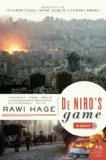Summary | Excerpt | Reviews | Beyond the Book | Read-Alikes | Genres & Themes | Author Bio

Critics' Opinion:
Readers' Opinion:
First Published:
Aug 2007, 256 pages
Paperback:
Aug 2008, 304 pages
 Book Reviewed by:
Book Reviewed by:
BookBrowse Review Team
Buy This Book
This article relates to De Niro's Game
The area now known as Lebanon (map) was settled by the seafaring Phoenicians (also known as Caananites) around 3,500 BCE. They established city states such as Beirut, Tyre and Sidon. Over the next five millennia the area would come under the control of numerous empires including the Persian, Greek, Roman, Byzantine, Arab, Crusader and Ottoman Empires. Throughout this period the area, like much of the Middle East, was not a defined country.
Following World War I and the collapse of the Ottoman Empire, the Allied nations carved up the Middle East, redrawing the political map of the Arab world into mandated territories which they then reorganized into states. France had the mandate for the area known as Greater Syria, and in 1920 formed the State of Greater Lebanon as one of the ethnic enclaves within Syria. Christian Maronites (an Eastern Catholic Church that traces its heritage to St Maron, a 5th century monk) represented the majority of the population, but there were also significant populations of Muslims and Druzes.*
A campaign for independence, mainly led by Maronites, led to independence in 1943. The last French troops withdrew in 1946, following the end of World War II. From then until 1975, Lebanon was a relatively calm and prosperous region, known as the "Paris of the Middle East" and the banking capital of the Arab world.
However, two factors marred the country's chance for lasting peace. The first was an unbalanced power-sharing agreement in which the right-wing Christian population dominated politics while the Muslim half of the population were to a great extent excluded. The second was the influx of displaced Palestinian Muslim refugees from the Arab-Israeli conflict, who continued their attacks on Israel from bases within Lebanon.
In 1975 civil war broke out between the Muslim coalition allied with the Palestine Liberation Organization (PLO) and the Christian-dominated militias. Sporadic violence continued until 1978 when Israel invaded southern Lebanon in an attempt to eliminate Palestinian bases. They withdraw after a UN peacekeeping force was sent to intervene, but reinvaded in 1982, occupying Beirut and forcing the PLO to evacuate its headquarters. In 1982, following the attempted assassination of Shlomo Argov, Israeli ambassador to Britain, Israel launched a full-scale invasion of Lebanon - "Operation Peace for Galilee". After a multinational Force was deployed to Beirut, the Israeli troops withdrew to southern Lebanon. Not long after, Western forces pulled out (after 300 US and French troops were killed) leaving the various Druze, Muslim and Christian factions to fight among themselves, supported by Israel, Syria, Iran, Palestine, and probably others.
In 1990, the Syrian air force attacked the Presidential Palace in Lebanon, marking the end of the civil war, and a few months later a government of reconciliation was formed, but Hezbollah* was allowed to remain active and the Southern Lebanon Army refused to disband.
Since then, reconstruction efforts have been underway while outbreaks of fighting between Israel and Hezbollah continue. In July 2006, Hezbollah militia captured two Israeli soldiers; Israel responded with a 34-day military offensive and a blockade. Around 1,000 Lebanese, most of them civilians, were killed in the 6-week crisis, and the damage to civilian infrastructure was wide-ranging. A UN peacekeeping force is now deployed along the Blue Line that marks Lebanon's border with Israel and the disputed Golan Heights.
*Worldwide, there are estimated to be about 1 millionDruze, mainly in Syria, Lebanon and Israel. They are a Middle Eastern religious-philosophical community which appears to have its roots in Islam but also incorporates Greek philosophy and Hindu influences. The Druze consider their faith to be an interpretation of the three monotheistic religions: Judaism, Christianity and Islam. They recognize prophets from all three religions including Moses, Jesus and Mohammed. In addition they hold others such as Socrates, Plato and Aristotle in high regard as advocates of justice and belief in one god. The Druze creed came into being in the 10th century and, after a short period of proselytizing, the religion has been closed to outsiders since about 1050. The Druze religion does not allow them to intermarry with any other religion.
* Hizballah (The Party of God) is a Shia-Islamic movement founded after the Israeli military seizure of Lebanon in 1982. Today, it is a powerful movement which controls much of southern Lebanon and enjoys Syrian and Iranian support.
To summarize the history of any country in a few hundred words is challenging, particularly so for politically complex countries such as The Lebanese Republic. We hope that our efforts help to enlighten without misleading. Sources referenced for this short history include TheBBC and their usefultimeline, A House of Many Mansions,Wikipedia and theCIA Factbook.
Filed under Places, Cultures & Identities
![]() This "beyond the book article" relates to De Niro's Game. It originally ran in October 2007 and has been updated for the
August 2008 paperback edition.
Go to magazine.
This "beyond the book article" relates to De Niro's Game. It originally ran in October 2007 and has been updated for the
August 2008 paperback edition.
Go to magazine.





The House on Biscayne Bay
by Chanel Cleeton
As death stalks a gothic mansion in Miami, the lives of two women intertwine as the past and present collide.

The Flower Sisters
by Michelle Collins Anderson
From the new Fannie Flagg of the Ozarks, a richly-woven story of family, forgiveness, and reinvention.

The Funeral Cryer by Wenyan Lu
Debut novelist Wenyan Lu brings us this witty yet profound story about one woman's midlife reawakening in contemporary rural China.
Your guide toexceptional books
BookBrowse seeks out and recommends the best in contemporary fiction and nonfiction—books that not only engage and entertain but also deepen our understanding of ourselves and the world around us.